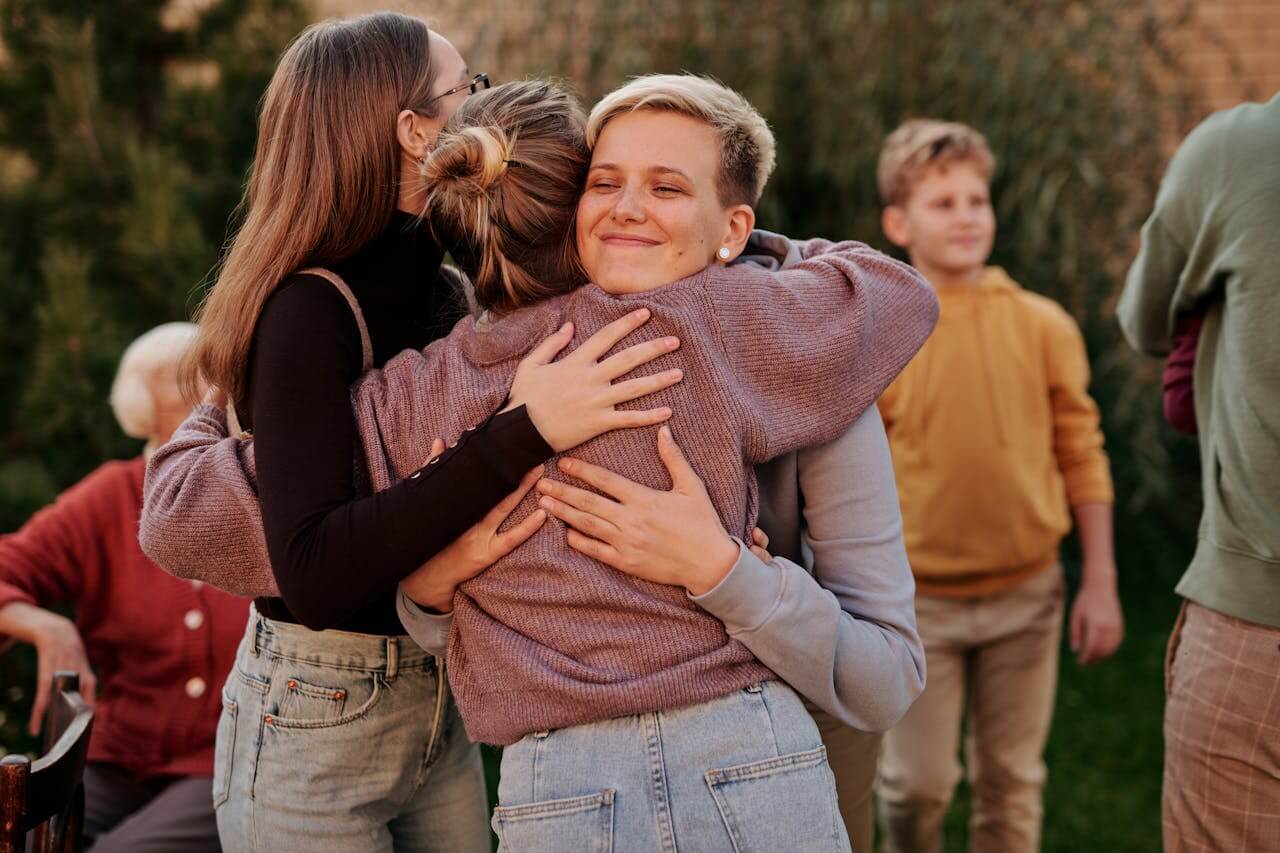The Importance of Socialization and Social Connections for Well-being
This week, we’ll dive deeper into the importance of socialization for well-being. But before we begin, let me tell you a story that may sound familiar.
Sasha had always been a creature of habit. Every morning, she’d grab her coffee, slip on her headphones, and navigate the bustling subway to work without making eye contact with anyone. Her evenings followed a similar pattern – Netflix, takeout, and the comforting solitude of her apartment. She told herself she was content, that she didn’t need anyone else to learn how to be happy.
But something shifted the day her train broke down. Stranded for an hour underground with dozens of strangers, Sasha found herself in an unexpected conversation with Maria, an elderly woman sitting beside her. They talked about everything from Maria’s grandchildren to Sasha’s photography hobby. When the train finally moved, Sasha realized she felt more energized and alive than she had in months.
That brief encounter opened Sasha’s eyes to something profound: the importance of socialization extends far beyond casual pleasantries. Those moments of genuine human connection, whether with loved ones or complete strangers, hold incredible power to transform our health, happiness, and overall well-being. Understanding how to get friends, strengthen existing relationships, and appreciate the importance of social interactions can literally add years to our lives while making those years infinitely richer. When we truly grasp the importance of socialization, we discover that learning how to be happy becomes significantly easier.

The Life-Extending Power of Social Connections
The research is crystal clear: the importance of socialization isn’t just about feeling good. It’s essential for survival and thriving. Studies show that having strong social connections increases longevity by roughly 50 percent, making social bonds as crucial to our health as eating well, exercising regularly, and getting adequate sleep.
Physical Health Benefits
When we understand the importance of socialization and engage in meaningful social interactions, our bodies respond in remarkable ways. Social connections trigger the release of beneficial hormones like oxytocin, dopamine, and serotonin, which boost immune system function, reduce stress hormone cortisol levels, and create feelings of happiness. This biochemical response isn’t just temporary – it creates lasting changes that protect against disease and illness.
The cardiovascular benefits alone are stunning. People with robust social networks show lower blood pressure, reduced inflammation markers, and decreased risk of heart disease. The importance of social interactions becomes even more apparent when we consider that lack of social connections increases the odds of death by at least 50%, making loneliness as dangerous to our health as smoking or obesity.
Immune System Strengthening
Social connections act as a powerful immune system booster. When we feel supported and loved, our bodies produce more infection-fighting white blood cells while reducing inflammatory responses that can lead to chronic diseases. This biological armor helps protect us from everything from common colds to more serious health challenges. Understanding how to get friends and maintain these connections becomes a crucial health strategy.
Brain Health and Cognitive Protection
Regular social engagement keeps our minds sharp and may protect against cognitive decline and dementia. The mental stimulation that comes from conversation, shared activities, and maintaining relationships creates new neural pathways and strengthens existing ones. Learning how to improve relationships isn’t just about emotional satisfaction. It’s about preserving our cognitive abilities as we age while discovering how to be happy through meaningful connections.

The Happiness Factor: Mental and Emotional Well-being Benefits
Beyond the physical advantages, the importance of social interactions for our mental health cannot be overstated. People who feel more connected to others have lower levels of anxiety and depression, along with higher self-esteem and greater empathy. When we master how to get friends and nurture relationships, we unlock powerful pathways to lasting happiness.
Stress Reduction and Emotional Resilience
Social support serves as a powerful buffer against life’s inevitable stresses. When we face challenges, having people to turn to provides both practical help and emotional comfort. This support system doesn’t just make difficult times more bearable. It actually changes how our bodies process stress, leading to lower cortisol levels and faster recovery from stressful events. The importance of socialization becomes clear when we see how connections literally reshape our stress response.
Enhanced Self-Worth and Confidence
Regular positive social interactions reinforce our sense of value and belonging. When others show interest in our thoughts, feelings, and experiences, it validates our worth and strengthens our self-esteem. This boost in confidence creates a positive cycle. As we feel better about ourselves, we’re more motivated to learn how to get friends and expand our social circles.
Greater Life Satisfaction and Purpose
Strong social connections provide meaning and purpose to our daily lives, giving us reasons to care about our health, pursue goals, and contribute to something larger than ourselves. The importance of social interactions extends to every aspect of well-being, showing us how to be happy through genuine human connection.
Emotional Regulation and Support
Friends and family members help us process emotions, gain perspective on problems, and celebrate successes. This emotional co-regulation is particularly important during difficult times, when isolation can amplify negative feelings and make challenges seem insurmountable. Learning how to improve relationships gives us the tools to build these crucial support systems.

What the Science Says: Groundbreaking Research on Social Connections
The evidence supporting the importance of socialization continues to grow, with fascinating studies revealing just how powerful human connection can be. These research findings help us understand how to be happy and why the importance of social interactions cannot be ignored.
The Public Transit Connection Study
Nicholas Epley and his colleagues conducted a remarkable experiment that challenged our assumptions about social interaction. They divided 139 people into three groups: one instructed to make meaningful connections with strangers on public transit, another told to enjoy solitude, and a control group asked to behave normally.
Surprisingly, while participants predicted that making connections would be awkward and unpleasant, the opposite proved true. The group that engaged with strangers experienced the highest happiness levels, while the solitude group reported the lowest. Even more interesting, the strangers who were approached also experienced significant mood boosts, contradicting predictions that they would dislike being “bothered.” This study perfectly illustrates the importance of socialization in unexpected settings.
The Chocolate Tasting Revelation
Erika Boothby and her team discovered that we enjoy virtually everything more when experiencing it with others. In their chocolate tasting study, participants who sampled delicious chocolates alongside complete strangers reported significantly more enjoyment than those who tasted alone. This research highlights how the importance of social interactions extends to even simple pleasures, showing us practical ways to be happy through shared experiences.
The Eavesdropping on Happiness Study
This groundbreaking research followed 79 students for four days, using digital recorders to capture their social interactions. The findings were clear: higher well-being was linked to more conversations and less time alone. Specifically, participants who engaged in more substantive conversations (rather than small talk) and spent less time in isolation reported significantly greater life satisfaction. This study demonstrates the importance of social interactions in daily happiness levels.
The Six-Hour Social Sweet Spot
According to Gallup research, the happiest people socialize approximately six hours daily, particularly with family members, coworkers, and neighbors. This doesn’t mean you need six hours of intense social interaction – it includes all forms of connection, from quick chats with coworkers to family dinners. This research helps us understand how to get friends and maintain the social engagement necessary for optimal well-being.
Recent Longevity Research
A 2023 study of more than 28,000 older adults found that those who socialized most frequently lived the longest compared to people who didn’t socialize. This massive study reinforces that learning how to get friends and maintain social connections isn’t just about current happiness – it’s an investment in a longer, healthier future. The importance of socialization for longevity cannot be understated.

Your Weekly Challenge: Building New Social Connections
This week’s challenge focuses on expanding your social circle through intentional daily connections. The goal is simple yet powerful: make one new social connection each day for seven consecutive days. This challenge demonstrates the importance of socialization through direct experience.
This doesn’t require grand gestures or lengthy conversations. Your daily connection might involve chatting with a colleague you’ve only nodded to previously, striking up a conversation with someone on public transportation, or simply asking a shop assistant or waiter about their day. The key is genuine engagement – taking time to truly connect with another human being.
Yes, approaching strangers might feel uncomfortable initially. It pushes us outside our comfort zones and challenges our assumptions about social interaction. However, as the research clearly shows, these brief moments of connection create significant positive impacts for both parties involved. This is how to get friends naturally – through authentic, everyday interactions.
Each evening, document your social connection and reflect on how it made you feel. This tracking serves two purposes: it helps you recognize the immediate benefits of social engagement and gradually transforms this intentional practice into a natural habit. You’ll discover firsthand how to be happy through simple acts of connection.

Practical Exercises for Strengthening Social Bonds
Exercise 1: The Daily Connection Challenge
Commit to making one new social connection each day for an entire week. This connection can take many forms – a meaningful conversation with a distant colleague, a friendly chat with a fellow commuter, joining a community group, or engaging in genuine conversation with service workers you encounter. This exercise puts the importance of socialization into daily practice.
The key is authenticity. Move beyond surface-level pleasantries to create moments of genuine human connection. Ask open-ended questions, share appropriate personal details, and listen actively to responses. These small acts of reaching out may feel awkward initially, but they become more natural with practice and show you how to get friends organically.
Document each interaction and your emotional response. You’ll likely discover that these brief connections energize you in unexpected ways and create positive ripple effects throughout your day. This is how to be happy through intentional social engagement.
Exercise 2: Finding Inspiration in Others
Everyone around us has something to teach. Some people inspire us with their resilience, others with their compassion or business acumen. Some demonstrate mindfulness or gratitude, while others show us when it’s appropriate to set firm boundaries. This exercise helps you appreciate the importance of social interactions as learning opportunities.
Practice viewing everyone you meet as a potential teacher. Ask yourself three questions: Who inspires you and why? What can you do today that would make your inspirational figures proud? How can you inspire others through your words and actions?
This exercise shifts your perspective from seeing social interactions as obligations to viewing them as opportunities for growth and learning. When you approach others with curiosity and appreciation, you naturally learn how to improve relationships and discover how to be happy in new ways.
Exercise 3: The Balance Rule in Relationships
Healthy relationships require a balance between giving and receiving. You deserve approximately as much understanding, patience, and love as you’re willing to give. This balance is crucial for maintaining your energy and sense of self while building sustainable connections. Understanding this principle is essential for learning how to improve relationships effectively.
Evaluate your current relationships honestly. Identify which ones drain you because you consistently give more than you receive. Consider how you might address these imbalances – perhaps by seeking fulfillment elsewhere, having honest conversations about your needs, or deciding whether to maintain these relationships in their current form.
Sometimes transforming a demanding friendship into a casual acquaintance is the healthiest option for everyone involved. Learning how to improve relationships often means knowing when and how to adjust their intensity. This wisdom helps you focus your energy on connections that truly support your well-being.
Exercise 4: Eliminating Toxic Relationships
Not all relationship problems signal the need for immediate termination. Complex human connections deserve effort and patience. When facing difficulties, start with open, honest communication. Many misunderstandings can be resolved through direct conversation about needs, expectations, and boundaries. This approach demonstrates how to improve relationships through clear communication.
However, some relationships are genuinely toxic and detrimental to your well-being. If you’ve made sincere efforts to address problems and the relationship continues to drain your energy or harm your mental health, it’s time to prioritize your well-being over preserving the connection.
Removing yourself from toxic relationships isn’t selfish – it’s necessary self-care that creates space for healthier connections to flourish. This difficult but important step is crucial for learning how to be happy and maintaining your emotional health.
Exercise 5: Establishing Healthy Boundaries
Think of yourself as an independent nation with the right to establish borders. Healthy boundaries don’t mean isolating yourself from everyone. Instead, they mean choosing carefully who gains access to your time, energy, and emotional space. This skill is fundamental to learning how to get friends who truly value and respect you.
People who consistently disrespect, belittle, or fail to appreciate you don’t deserve unlimited access to your life. Neither do those who treat you as an emotional dumping ground, nor those who show narcissistic disregard for your well-being. Setting these boundaries is essential for learning how to improve relationships and protect your mental health.
Setting boundaries requires recognizing your own worth. If you struggle with this, invest time in building your self-esteem first. As you grow in self-respect, you’ll naturally become more selective about the relationships you maintain and more skilled at protecting your emotional well-being.

Your Journey Toward Meaningful Connection
The importance of socialization extends far beyond casual social activities. It’s about creating a support network that enhances every aspect of your life. From the biochemical changes that boost your immune system to the emotional support that helps you navigate challenges, social connections provide benefits that no amount of individual achievement can match.
Understanding how to get friends and learning how to improve relationships are skills that pay dividends throughout your entire life. Every conversation with a stranger, every deepened friendship, and every healthy boundary you establish contributes to a richer, more fulfilling existence. These skills are fundamental to discovering how to be happy in sustainable, meaningful ways.
The beauty of social connection lies in its accessibility. You don’t need special talents, expensive equipment, or perfect circumstances to begin building meaningful relationships. All you need is the willingness to be genuinely interested in others and the courage to step slightly outside your comfort zone. This is the essence of the importance of socialization – it’s available to everyone, everywhere.
Remember that small steps create significant changes. The person sitting next to you on the bus, the barista who makes your coffee, the neighbor you’ve never really talked to – each represents an opportunity for connection that could brighten both your days. The importance of social interactions becomes clear when we realize these moments can transform ordinary days into meaningful experiences.
When we prioritize the importance of socialization and actively work to strengthen our connections, we’re not just improving our own lives. We’re also contributing to a more connected, compassionate world where everyone benefits from the healing power of human connection. This understanding of how to be happy through relationship building creates ripple effects that extend far beyond our immediate circles.

Let’s Take a Step Further
If you’re feeling inspired to deepen your relationships and enhance your well-being but need personalized guidance, consider working with a coach who specializes in positive psychology. Professional coaching can help you develop stronger social skills, overcome limiting beliefs about relationships, and create sustainable strategies for building the meaningful connections you deserve.
Resources
The information in this article is grounded in scientific research. If you’re interested in specific studies, feel free to reach out to us.
For daily doses of joy, positivity, inspiration, and motivation, be sure to follow us on Instagram.
Za naše bralce v Sloveniji
Če vas zanima več o psihoterapiji in iskanju trajne sreče, preberite naslednje članke: Psihoterapija Obala, 5 ključev do trajne sreče in notranjega miru, Najboljši psihoterapevti v Sloveniji: Kako se hitro spopasti s stresom, Psiholog v Kopru: Kako odpraviti težave s psihoterapijo in RTT terapijo, in Psihoterapija Online: Prednosti in učinkovitost terapije na daljavo.


